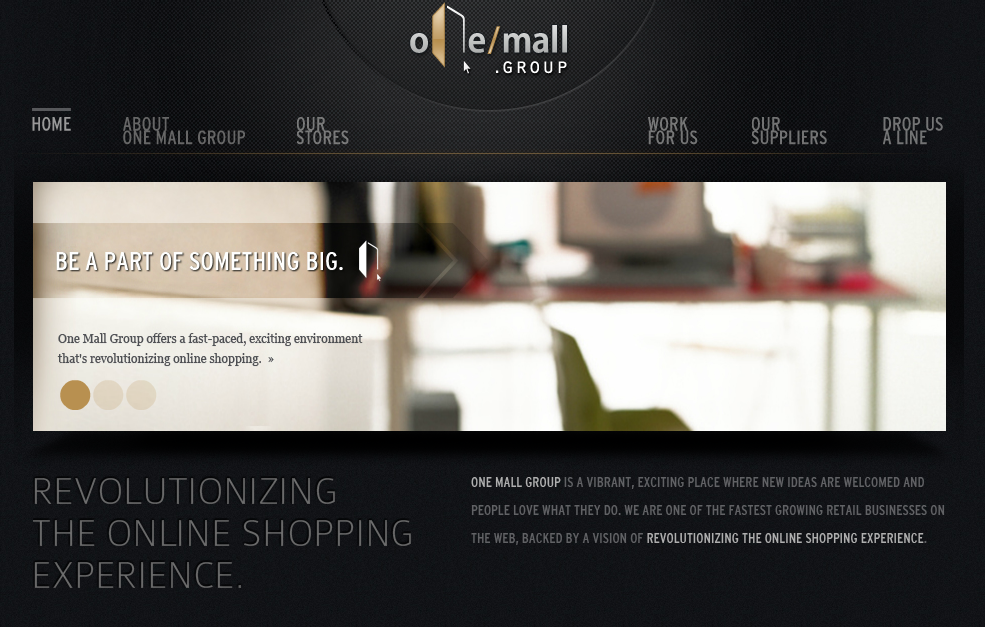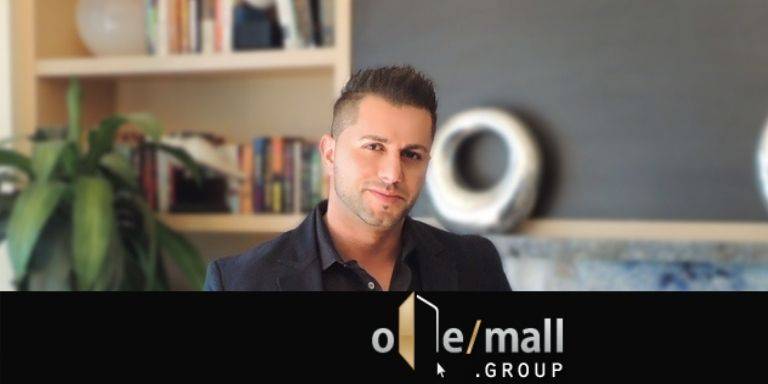Moe Kittaneh is the cofounder and president of One Mall Group, an e-commerce and retail collective founded in 2007. His companies, including Amerisleep.com aim to improve the online retail experience with unconventional products and approaches. Built from the ground up, Moe’s companies have successfully leveraged internet technology, both in website user interfaces and in marketing, to build flourishing and competitive brands.
“Having clear goals is like GPS for your business; goals show you what direction to go and steps for getting there.” – Moe Kittaneh
Please tell us a little bit about your company – what is One Mall Group all about?
One Mall Group is a collective of several online businesses, primarily focused on the online retail of consumer household goods. As a company, we try to take an innovative approach to retail that leverages current technology and human creativity to focus on improving the consumer experience. One Mall Group is also about being as eco-friendly as possible, and offering products that deliver quality and value. Two of our most successful brands include Amerisleep, our natural memory foam mattress brand, and Astrabeds, our natural latex mattress brand.
Please tell us a little bit about your background and how you started your company?
I came to Kansas from Dubai in my teens for college, and I started my first business at age 19, after seeing an opportunity for a salon where I was living. I enjoyed quick success, learning about business operations and finance, and eventually failure as well, due to some short-sighted decisions.
After a few other ventures, I co-founded the company that later developed into One Mall Group with my brother in 2006. This was a physical retail store selling mattresses and bedding in Arizona. In 2007, we begin venturing into online retail, and then moved exclusively online in 2008.
We decided to focus on options that were more natural than major mattress retailers’ offerings, which directed the development of the Amerisleep and Astrabed product lines. The commitment to healthier products and our value-centric approach set our brands apart in the market, and helped us quickly attract the rapidly-growing consumer base interested in these type of products.
What are some of the projects you are working on right now?
One of the projects I am working on right now is opening a new office and retail showroom for our flagship brand, Amerisleep. We’ve been successful as an online-only company, but I think the time is right to connect with customers via a tangible showroom that allows them to visit us and test out our beds. Our challenge is that we want this retail experience to be completely different from one you’ve had at other mattress stores. The vision is hi-tech and open, personal and exceedingly comfortable, and I am excited to see how this is received in the marketplace.
I am also working on taking our natural latex brand, Astrabeds, to the next level by incorporating 100% organic materials. Currently we use pure, natural latex and organic cotton, but the segment of consumers seeking all-organic bedding is increasing and showing no sign of slowing down. My plan is to be using 100% organic materials this year.
What are your plans for the future, how do you plan to grow this company?
I plan to continue growing One Mall Group and our businesses by maintaining the same core principles that have got us this far, but also by focusing more on innovation and the consumer experience. Our goal is to reach more people by offering an alternative way to shop, actually listening to what customers want, and of course by offering a good product and value relative to other leading competitors. One big way I plan on adding value is to make delivery speeds even quicker, for example.
Physical retail is another avenue for growth that we are exploring, and I also have plans to expand into other sectors beyond product retail. Two projects I have plans for include working on a highly selective retail distribution plan to broaden our brands’ reach, and working on taking Amerisleep to international markets. I believe this direction will dramatically increase growth in the next 5 years.

What were the top 3 mistakes you made starting your business and what did you learn from it?
One big mistake for startups, tech or retail, is to be wasteful or careless with money, especially when first starting out. On one hand, you want to make a good impression and have that shiny office of your dreams, but on the other hand, you do not want to go into debt, spend money you don’t have, or buy things you don’t need. Every business has ups and downs, and if all of your cashflow is tied up in office supplies, decor, expensive tech or other non-essentials, you could find yourself in a tight spot when a lull hits. Through experience, I have learned to carefully monitor expenses and bank accounts, think lean in terms of inventory and supplies, and always have cash reserves just in case.
Another mistake is going into a business without clear goals or direction, which is a good way to set yourself up for failure or stagnation. I’ve learned to always articulate my vision, and short and long-term goals, even if it is just to myself. This helps me plan my strategy and make coherent decisions that fit into my goals. Imagine where you want to be in 1 month, 6 months, 1 year, 5 years – once you’ve established a trajectory, you can start seeing what you need to do to get there. Having clear goals is like GPS for your business; goals show you what direction to go and steps for getting there.
The third most important thing is that it can prove crucial to choose your business partners wisely. It might seem fun to start a company with a good friend, but is that the best business decision? You should look at their characteristics – are they reliable, honest, responsible, good with money, etc.. or are they flaky, unfocused, wasteful etc? Even if you’ve known a potential partner for years, money has a way of bringing out the worst in people, and how they act in business may be totally different than how they act as your friend. I’ve learned about the importance of protecting myself and my start-up – whether that means contracts that spell out terms, clearly delineated job duties, or other devices to help reduce confusion and disputes down the road.
Please share some advice for new entrepreneurs, someone who’s just starting out
Do something that you are passionate and excited about, or find a way to get excited about what you have already started (either by improving your product or changing your outlook). If you are in it just for the money, or are not confident in your service or product, it will likely come across that way to your potential clients and customers. To avoid burnout and remained focus, you want to invest your time and energy into something that has you excited to wake up every morning.
What was the best business advice you have ever received and who gave you this advice?
My father is my inspiration for being an entrepreneur. He came from a modest background and moved his family to a new country, working his way up in a short period of time to be successful in government, real estate, and other ventures. When I was younger, he would always try to instill a sense of independence, and he taught me the importance of running businesses in an ethical and honest manner. Though he has gave me an infinite amount of advice over the years, I would say one of his best bits of wisdom was to be brave and to take risks, because ultimately failure doesn’t matter, what matters is that you get up and try again.
What are the top 3 online tools and resources you’re currently using to grow your company
(1) – As an online company, we rely heavily on other online services and solutions. I would say the number one online resource for growth is social media like Twitter, Facebook and Youtube – getting positive exposure your name and brand.
(2) – Number two would have to be consumer content and reviews, in which real customers share their experiences online via verified reviews on our websites as well as on third-party websites like ResellerRatings.com and especially on their personal blogs.
(3) – Another excellent online/electronic resource for growth is EDI (electronic data interchange), which we’ve just recently started using. EDI allows us to transmit orders seamlessly to manufacturers for much faster turn around and fewer errors, which is important when operating a lean online retail business. The quicker delivery times also prove more attractive to customers.
What’s your definition of success?
My definition of success is being financially independent, having a business that really makes a difference, achieving strong brand recognition, and doing all of that while maintaining personal integrity and health. You can make fast money doing unethical things, but I wouldn’t count that as successful personally, and if your business isn’t something people actually want, like or need, than it won’t last. Essentially, success to me is achieving the business and financial goals I’ve set out for, without compromising on principles.
What are three books you recommend entrepreneurs to read?
To be honest, I’m not much of a book reader. I’m usually interested in maximizing my time and getting the most knowledge in the limited free time I have. Rather than reading regurgitated, watered-down advice, I’d rather follow blogs and social media feeds for the people I admire who have practical and inspiring wisdom to share. When I have some down time at night or want a quick breather during the day, I’ll scan new articles and information I’m interested in and inspired by. A few of my bookmarks I visit often include:
What is your favorite entrepreneurship quote?
I have so many favorite quotes, it really is difficult to choose only one! I like to save and refer to wise quotes that communicate useful advice, often much more eloquently than I might be able to. One of my favorites for entrepreneurship is from Jim Rohn:
“Discipline is the bridge between goals and accomplishment.” – Jim Rohn
Discipline, focus and effort often distinguish successful entrepreneurs, as these traits are necessary to transform a latent goal into a tangible achievement – slacking off, inattention and not trying will not help you reach your goals.








